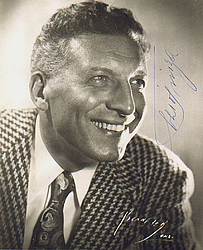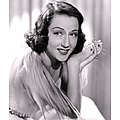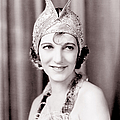Ezio Pinza Biography
Ezio Pinza (May 18, 1892 – May 9, 1957) was an Italian opera singer. A bass with a rich, smooth and sonorous voice, he spent 22 seasons at New York's Metropolitan Opera, appearing in more than 750 performances of 50 operas. Pinza also sang to great acclaim at La Scala, Milan, and at the Royal Opera House, Covent Garden, London. After retiring from the Met in 1948, Pinza enjoyed a fresh career on Broadway in the musical theatre and also appeared in several Hollywood films. Pinza was born in modest circumstances in Rome in 1892 and grew up on Italy's east coast, in the ancient city of Ravenna. He studied singing at Bologna's Conservatorio Martini, making his operatic debut in 1914, as Oroveso in Norma at Cremona. A devotee of bicycle racing, Pinza also undertook four years of military service during World War I, prior to resuming his operatic career in Rome in 1919. He was then invited to sing at Italy's foremost opera house, La Scala, Milan, making his debut there in February 1922. At La Scala, under the direction of the brilliant and exacting principal conductor Arturo Toscanini, Pinza's career blossomed during the course of the next few seasons. He became a popular favourite of critics and audiences due to the high quality of his singing and the attractiveness of his stage presence. Pinza's Metropolitan Opera debut occurred in November 1926 in Spontini's La vestale, with famed American soprano Rosa Ponselle in the title role. In 1929, he sang Don Giovanni, a role with which he was subsequently to become closely identified. He subsequently added the Mozart roles Figaro (in 1940) and Sarastro (in 1942) to his repertoire, a vast number of Italian operatic roles of Bellini, Donizetti, and Verdi, and Mussorgsky's Boris Godunov (sung in Italian). Apart from the Met, Pinza appeared at the Royal Opera House, Covent Garden, in 1930-1939, and was invited to sing at the Salzburg Festival in 1934-1937 by the celebrated German conductor Bruno Walter. Pinza sang once again under the baton of Toscanini in 1935, this time with the New York Philharmonic Orchestra, as the bass soloist in performances of Beethoven's Missa Solemnis. One of these performances was broadcast by CBS and preserved on transcription discs; this recording has been issued on LPs and CDs. He also sang in the February 6, 1938, NBC Symphony Orchestra's broadcast performance of Beethoven's Ninth Symphony.[1] These performances both took place in Carnegie Hall. Pinza's repertoire consisted of some 95 classical parts. He retired from the Met in 1948 and embarked on a second career in Broadway musicals. In April 1949, he appeared in Rodgers and Hammerstein's South Pacific, originating the role of French Planter Emil de Becque, and his operatic-style, highly expressive performance of the hit song "Some Enchanted Evening" made him a matinée idol and a national celebrity. In 1950, he received a Tony Award for best lead actor in a musical. Pinza became a member of Westchester Country Club in Rye, New York, and lived in a private house adjacent to the fifth golf hole of the South Course. In 1953, he had his own short-lived NBC situation comedy on TV, Bonino, in which he appeared as a recently widowed Italian-American opera singer trying to rear six children. Two of the children were portrayed by Van Dyke Parks and Chet Allen, who had also been with the American Boychoir. Mary Wickes appeared on Bonino as the bossy housekeeper. Then, in 1954, he appeared in the Broadway production of Fanny opposite Florence Henderson. Shortly before his death, Pinza completed his memoirs, which were published in 1958 by Rinehart & Co., Inc. Photos taken during his career, as well as images of his family, were included in the book.[2] Pinza died of a stroke at the age of 64 in Stamford, Connecticut. His funeral was held at the Cathedral of St. John the Divine in New York City.[3] He is interred at Putnam Cemetery, in Greenwich, Connecticut. Devoid of academic training, Pinza was unable to sight-read a musical score. However, he would listen to his part played on the piano and then sing it accurately. Pinza succeeded the great Italian basses Francesco Navarini and Vittorio Arimondi, both of whom enjoyed international opera careers during the late 19th and early 20th centuries, and Nazzareno De Angelis, who arrived on the scene in the early 1900s. (Another of his eminent predecessors in the Italian operatic repertoire was the Spaniard Jose Mardones, who had appeared regularly with the Boston and Met companies between 1909 and 1926.) Tancredi Pasero, whose vibrant voice sounded remarkably similar to Pinza's, was his chief contemporary rival among Italian-born basses. Pasero, however, lacked Pinza's magnetic personality. Pinza appeared in several films, beginning with 1947's Carnegie Hall, which featured a number of famous classical singers, musicians, conductors, and the New York Philharmonic Orchestra. He also can be seen in a few MGM movies (in Technicolor), including Mr. Imperium with Lana Turner and Strictly Dishonorable, both released in 1951. His final big-screen appearance was in 1953's Tonight We Sing, playing the famous Russian bass Feodor Chaliapin in a movie biography of impresario Sol Hurok. During this movie, Pinza sings a portion of Mussorgsky's Boris Godunov in the original Russian. A recording of his singing Anema e core is heard in the 1980 film The Blues Brothers playing on the radio in the scene where Jake and Elmer visit Mrs Tarantino. Pinza hosted his own television musical program during 1951, which for a time alternated with The RCA Victor Show Starring Dennis Day, later named The Dennis Day Show. Pinza continued to make appearances on American television until 1955.[4] He appeared on NBC's The Martha Raye Show. Pinza had sung opposite many celebrated singers at the Met during his heyday. They included, among others, such international stars as Amelita Galli-Curci, Rosa Ponselle, Elisabeth Rethberg, Giovanni Martinelli, Beniamino Gigli, Lawrence Tibbett, Giuseppe De Luca,and [{Salvatore Baccaloni}]. An interesting bit of trivia is the fact that all the water fountains at the Met were dedicated to him.
Ezio Pinza Lyrics
Write a comment
What do you think about Ezio Pinza? Let us know in the comments below!
Ezio Pinza Albums
| Title | Release | ||
|---|---|---|---|
| 1 | Broadway: The Great Original Cast Recordings |











